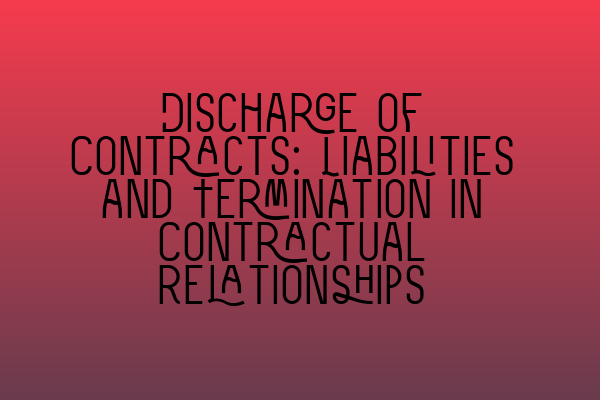Discharge of Contracts: Liabilities and Termination in Contractual Relationships
In the complex world of contract law, the discharge of contracts plays a fundamental role in determining the rights and obligations of parties involved. It is crucial to understand how contracts can be terminated and the liabilities that arise as a result. In this article, we will explore the various methods of contract discharge and delve into the legal implications involved.
Methods of Contract Discharge
Contracts can be discharged in several ways, and it’s essential to have a comprehensive understanding of these methods. The primary methods of contract discharge include:
- Performance: The most straightforward way to discharge a contract is through complete performance, where both parties fulfill their respective obligations. This can be seen as the ideal outcome, as it ensures the fulfillment of the agreed terms.
- Agreement: Parties may mutually agree to terminate a contract if both parties are in accord. This can be through a verbal agreement or a written contract amendment. It’s important to document such agreements to avoid any future disputes.
- Breach: When a party fails to fulfill its obligations under a contract without a legal excuse, it constitutes a breach. A breach can result in the innocent party having the right to terminate the contract or seek legal remedies for the damages incurred as a result of the breach.
- Frustration: Frustration occurs when an unforeseen event, not caused by either party, makes it impossible to fulfill the contract’s obligations. In such cases, the contract may be deemed frustrated, and both parties may be discharged from their respective duties.
- Operation of Law: Certain circumstances, such as death, illegality, or bankruptcy, may lead to the automatic termination of a contract by operation of law. It is crucial to be aware of these legal implications to protect your interests.
Each method of contract discharge has its own set of legal ramifications and considerations. It is advisable to consult a qualified solicitor to determine the most appropriate course of action based on your specific contractual relationship.
Liabilities in Contractual Relationships
Contracts give rise to certain obligations and liabilities for all parties involved. Understanding these liabilities is crucial for protecting your interests and avoiding potential legal disputes. Here are some of the key liabilities that may arise in contractual relationships:
- Performance Obligations: Parties are obligated to fulfill their contractual promises. Failure to do so can result in potential legal action and damages.
- Negligence and Misrepresentation: Parties must exercise reasonable care and honesty when entering into contracts. Any negligent misrepresentation or fraud can lead to liability for the party at fault.
- Indemnity: Indemnity clauses may impose different levels of liability on the parties. It is essential to review these clauses carefully to understand your potential exposure and obligations.
- Breach of Contract: Breach of contract can result in liability for the party at fault. The innocent party may seek damages or specific performance to remedy the harm caused by the breach.
- Termination Clauses: Contractual agreements may include termination clauses that stipulate the consequences of termination. These clauses can impact the liabilities and obligations of the parties involved.
Understanding the liabilities in a contractual relationship is vital for navigating the legal landscape effectively. Seeking legal advice to review and understand your specific contractual arrangements is highly recommended.
Conclusion
Contracts are the backbone of numerous business relationships, and understanding the discharge and liabilities associated with them is crucial for protecting your rights and interests. By familiarizing yourself with the various methods of contract discharge and the potential liabilities that can arise, you can minimize the risks and effectively navigate any legal challenges.
At SQE Contract Law, we offer comprehensive preparation courses for the SQE exams, which cover topics such as contract law, discharge, and liabilities. If you’re preparing for the SQE exams, be sure to check out our SQE 1 Practice Exam Questions and SQE 1 Practice Mocks FLK1 FLK2 to sharpen your skills. We also provide SQE 2 Preparation Courses for a comprehensive understanding of contract law and other legal subjects.
Stay updated with the latest SRA SQE Exam Dates by visiting our SRA SQE Exam Dates page. If you have any specific queries or require professional legal advice, feel free to reach out to our team of experienced solicitors who are always ready to assist you.
